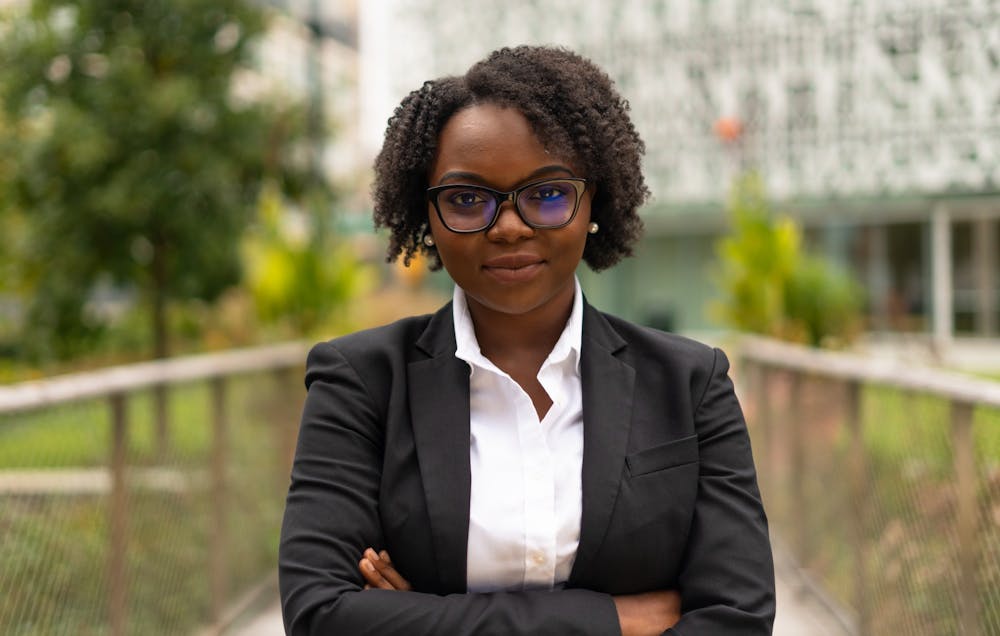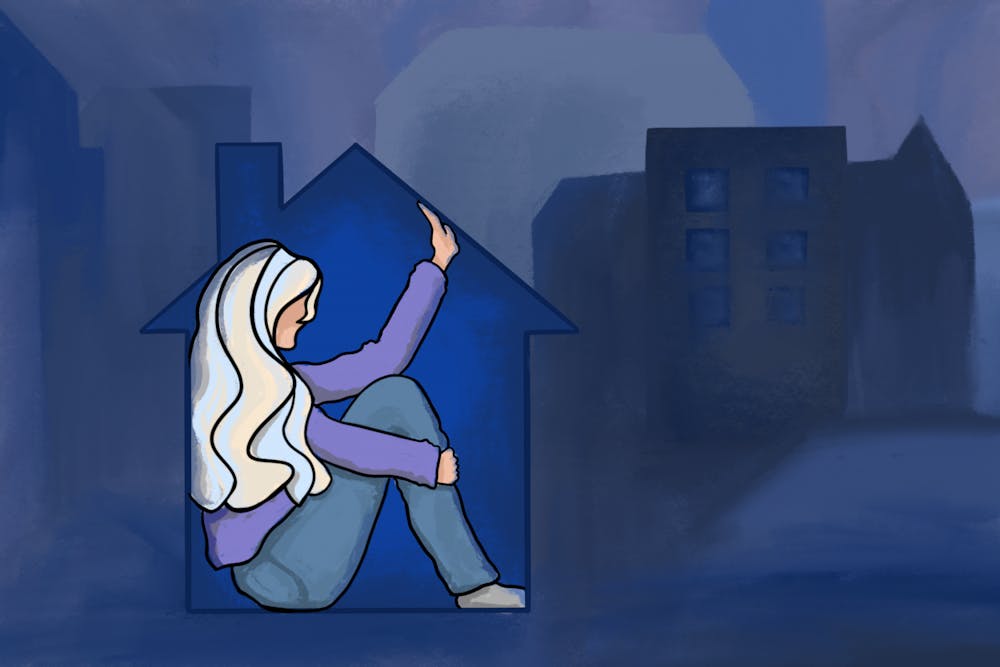When the pandemic began back in March, it was easy for students to joke about being stuck inside during spring break and preparing for a triumphant return to campus parties in a matter of weeks. But as weeks turned into months and the future looked increasingly bleak, the date for a return to normalcy fell back further and further: dreams of an in–person fall shifted into hopes for a hybrid fall. With those hopes dashed, students are now holding onto an in–person spring semester that may or may not happen.
The novelty of Zoom birthday parties and socially distant hangouts in high school parking lots have become a painful reminder of the human connections people have lost and will continue to lose. Seven months later, the pandemic’s stress–inducing circumstances continue to affect students’ daily lives.
Decades of research have illuminated the positive effects of social connection in reducing stress as well as the psychological stress that loneliness breeds. While many mental health concerns have stemmed from isolation, they are a collective experience. A recent report published by the Centers for Disease Control and Prevention about the pandemic’s effects on mental health found that one in four people aged 18 to 24 seriously considered suicide in June, and 18 to 24–year–olds reported the highest levels of anxiety and depression.
Penn students are no exception. As students adjust to online school, they face social isolation, overwhelming uncertainty, health concerns, and exacerbated financial and academic pressures. But despite the increased need for support, mental health organizations on campus have struggled to reach out to students. Physical distance and Zoom fatigue have made it more difficult for people to engage with the services they need.
In March, Counseling and Psychological Services (CAPS) made all of their services available remotely, including individual and group psychotherapy as well as drop–in services. Groups focus on topics in response to student need, including mindfulness, grief, and racial trauma.
“While there are challenges to not seeing people in person because we are interpersonally connected, we found that we could carve a comfortable space to connect with students over a video platform and, of course, over the phone,” CAPS Senior Clinical Director Michal Saraf says. “We’ve found that that kind of connection actually does work for most folks.” In fact, Saraf notes that some students have expressed that they prefer the flexibility associated with seeing their counselor virtually as it eliminates the need to travel to the Center.
However, despite attempts by CAPS to adapt to the new conditions of the pandemic and reach those in need, some students are falling through the cracks. Even with an unprecedented global pandemic, replete with hundreds of thousands of deaths, a severe recession, and the added stress of a virtual semester, attendance at CAPS is down, not up.
According to Saraf, “We [CAPS] are seeing not as many students as we typically see in the fall reaching out to CAPS. And we are trying to understand that currently. We are trying to understand what that says about the student experience.”

Phuong Vu. Taken by Melanie Hilman
Phuong Vu (E '21), co–president of the Reach–A–Peer Helpline (RAPLine), a peer help line that offers support to the Penn community, says that RAPLine has also received fewer inquiries from students now than in previous semesters.
“It’s harder to reach freshmen now because before we would normally have posters everywhere,” she says. “We would hand out business cards on Locust, but now with COVID, it’s hard to get the words out.”
Phuong believes that first years and upperclassmen alike may feel swamped by the amount of choices for mental health services at Penn, especially when they can’t walk into a building and physically meet with a counselor or peer.
“When those University emails are sent out, there is always a huge list of resources at the end,” she says. “That might be overwhelming to people. There are so many, ‘Which one do I choose?’”
Like CAPS, RAPLine and other centers on campus have had to adapt their services to continue supporting students in an online format.
For Malik Muhammad, Associate Director of Penn’s LGBT Center, the approach to cultivating online mental health spaces “comes down to meeting students where they are” and maintaining a sense of flexibility. The LGBT Center is focusing on fostering a sense of community so “folks know they’re not alone,” which in Muhammad’s eyes is “one of the most damaging” effects of the current circumstances. He thinks that having space to talk is essential for supporting mental health needs.
Phuong has relied heavily on talking to friends and family over video for the past months of the pandemic. As an international student from Vietnam, she could not go home when Penn announced that in–person classes for the fall semester were cancelled.
“There was no flight back home for me, so I was kind of stuck here,” says Phuong. “With that stress coupled with the stress of doing classes online and not meeting my friends, I was lucky because I have a lot of people around me who support me [remotely].”
“It helps me to know that I can offer that kind of support to the people who text into RAPLine. I am lucky because if I have any problems, I can call my friend and rant to them. But I understand that not everyone has someone that they can call and do that with.”
While all students have had to face new challenges, and many feel isolated, some communities have had unique obstacles.
“For folks in the LGBTQ+ community, there is an extra layer of isolation that may be happening,” Muhammad says. “A lot of our students had to either go back into the closet or hide different pieces of their identity that they have been able to authentically show and express when they are away at college. Going back home, sometimes you have to do that extra step of assessing your risk of how out and how open you can be.”
“So much of being in the LGBTQ+ community is about finding and cultivating your own chosen family," he says. "Having that chosen family oftentimes happens when you get to college, so we have to be very cognizant of how even more isolating this time can be for folks within the LGBTQ+ community.”

Muhammad describes the challenges students are facing as intersectional, affecting students of color in different ways.
“We are navigating a sense of extreme racial tension in our country,” he says. “It’s highlighting some of those extreme inequities we have been experiencing, for folks of color within the LGBTQ+ community, for our Black and Trans folks.”
Speaking to these inequities, Martha Gakunju (C’21), co–chair of UMOJA, the umbrella organization for Black student groups at Penn, believes that recognizing the weight of external factors is crucial for understanding and supporting Black students. Martha feels that professors should acknowledge how “what’s going on in the outside world can be really taxing” and how it impacts students’ abilities to perform in class.
Nationwide, Black people are dying at more than twice the rate of white people of COVID-19 Studies show that more than half of Black–owned businesses may not survive the pandemic. And the deaths of Breonna Taylor and George Floyd at the hands of police in the past year have exacerbated the negative psychological effects Black Americans experience as a result of racial discrimination.
“No one is acknowledging how what is going on externally is impacting academia,” Martha says. “A lot of people haven’t been very good at taking into account that we are going through a global pandemic that is impacting the personal livelihoods of so many students. Particularly, Black and Brown communities in America are the ones who are being the most horribly impacted, not only health–wise, but people are losing jobs. People are losing resources.”
Recently, Penn has taken steps to address racial inequalities, implementing anti–racism initiatives in each of the four undergraduate schools. After the University administration received a letter from UMOJA on June 4 with a host of demands—including providing academic and mental health resources specifically for Black students—PSG delivered a $250k grant to Black student groups to fund their own initiatives. Additionally, Campaign for Community, a University–led funding initiative, is encouraging proposals for projects concerning racial justice. However, Martha believes these efforts have not translated to better conditions in the classroom.
“There seems to be more work for everyone that we have talked to this semester than there ever has been,” Martha says. “Instead of doing discussions, you have to write 250 words every week, which can be exhausting.”

It’s not just the discussion posts that have replaced regular discussions in humanities classes. The added work from remote learning cuts across many disciplines. Students in STEM classes have reported spending significantly more time on work due to the long synchronous and asynchronous lectures they are required to watch. Martha also notes that social, political, and health pressures from outside of school have reduced students’ ability to focus on their assignments, even if their workload hasn’t actually increased.
“Everyone that I talk to is always like, ‘I’m always so tired even though I sleep for 10 hours a day.’ It’s just because it’s an exhausting time for all of us,” she says. "What we want to emphasize is not placing so much burden on students producing...in a time when the world is extracting from you consistently.”
Now that daily life is dominated by remote work and Zoom fatigue, mental health professionals are encouraging people to take a break from their screens. Yet video calls and texts have become the primary form of socialization for many stuck at home, and they are often the only avenues available for campus organizations to reach out to students. While CAPS has received positive student feedback on its virtual programming, other organizations are wary of contributing to the endless series of online meetings students have to attend for class, clubs, and social events.
“We’ve noticed that our students are Zoomed out,” Muhammad says. “In terms of mental health for our folks, a lot of it is stemming from ‘I’m tired, I’m exhausted, I’m tired of doing things over Zoom, but also I’m lonely, and I’m not connected.’”
The LGBT Center—which typically provides a safe physical space for students to engage with other community members in a judgment–free zone—is offering several new virtual opportunities that seek to engage students without overburdening them. On top of synchronous activities like a weekly KiKi where students chat with each other, the Center has partnered with CAPS to create a video series titled, “LGBTQ+ Tips: Navigating the New Normal.” The videos, which are only a few minutes long and accessible to students at any time, touch on maintaining a sense of inner peace through civil unrest, navigating personal identity, and supporting yourself through quarantine.
In response to the extra burden that many Black students are facing, Martha has scrapped typical UMOJA events to encourage rest among constituent groups and students. Martha wants students to prioritize well–being and to alleviate their own academic stress, whether it’s through “taking a class pass/fail, dropping a class or taking the minimum number of requirements.”
While more students confront the challenges of online learning during the pandemic and fewer reach out to on–campus resources, mental health organizations remain committed to being there and willing to listen to anyone who needs help.
“Before COVID and during this time, students can always call us 24/7,” says Dr. Batsirai Bvunzawabaya, Director of Outreach and Prevention Services at CAPS. “That has been available, but it is still available. It doesn’t have to be a crisis. It doesn’t have to be urgent. Students can just call us in the middle of the day if they are having a tough time.”

